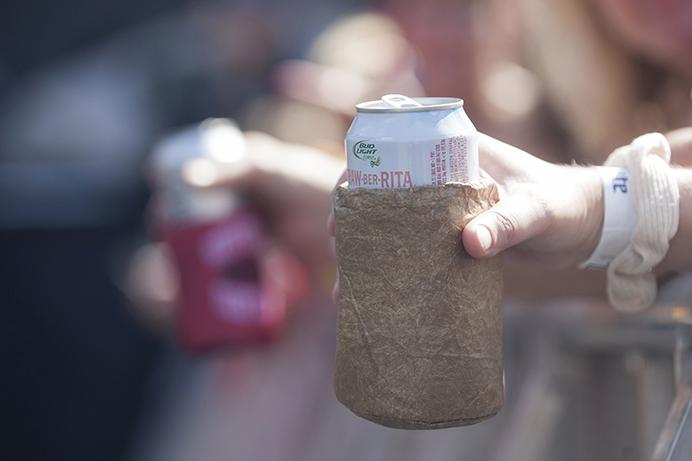by Joe Lane
In my three years giving nearly 200 tours of the University of Iowa, easily the most common questions are those about alcohol. Campus visitors are concerned about the prevalence of alcohol and the validity of our illustrious party school ranking (which has actually been in decline lately).
The reality — for better or worse — is that alcohol plays a significant role in the archetypal American college experience. Of course, not every student drinks, but according to a late-2015 study conducted by the National Institute of Alcohol Abuse and Alcoholism, 60 percent of college students, ages 18-22, drank alcohol in the past month, and two out of three of those engaged in binge drinking during that time.
The UI should not be a “dry” campus — at least not entirely. A “wet” campus helps students foster a healthier relationship with alcohol, provides an opportunity for students to utilize university facilities, and does more to create the real-world environment students need for post-graduation success. In this “partially-wet campus,” the residence halls, for example, would certainly remain dry.
But the IMU could be one such common gathering place for students. The River Room has the potential to be a gathering place like the Terrace at Wisconsin’s Memorial Union. Wisconsin’s Terrace — though significantly larger — overlooks Lake Mendota. IMU’s River Room overlooks an amphitheater and the Iowa River. Perhaps the greatest difference between the two is Wisconsin’s terrace serves alcohol and is constantly flooded with students and community members alike.
If (of-age) students could drink in the safe confines of this environment, our amphitheater could become a bustling, safe hub of student activity rather than an often-overlooked part of campus. Not to mention the potential increase in university revenue brought on by the sale of, say, beer from breweries like Big Grove or Backpocket.
Moreover, perhaps one of the most contentious locations, Kinnick Stadium, currently allows alcohol for select groups in the Press Box, with Dean of Students approval. On a trial basis, expanding alcohol sales to those who cannot afford the exorbitant prices of these seats may help prevent students from bringing in excessive amounts of their own alcohol in discrete ways.
It is the job of the university to properly educate students about the realities of alcohol consumption during and beyond their college career — as UI does with its pre-enrollment online courses. It is not, however, the job of the university to create an environment that develops a community of secretive drinking.
The response by greek-council leadership on our campus to situations that have unfolded recently during frequently alcohol-laden events, for example, is yet another example of why a healthier (rather than hidden) alcohol culture should exist.
The job of the American undergraduate institution is to prepare students for the real world. The best way to do so is to allow students to dip their toes in the waters of real life. Pretending that alcohol doesn’t exist in those environments does not best serve students.
Keep UI Dry
by Stephen Schrichfield
If you’re reading this as a current University of Iowa student, you probably didn’t care about the party-school reputation, dismissed it, or even took it into consideration when applying or deciding to attend. It’s undeniable the university is known for its renowned Writers’ Workshop, historic football program, bright students, and an unshakable party-school reputation.
Becoming a “wet” campus would foster a more welcoming attitude toward alcohol because of its abundant nature that easily has the potential to increase underage drinking as well as high-risk drinking. This “wet” campus notion would also supplement the institution’s party-school reputation. While alcohol is inexplicably a quintessential staple to the American college experience, advocating for a “wet” campus could lead to the overshadowing of Iowa’s best attributes by a more prevalent force, the abundance of constant drinking.
I am not naïve nor do I believe certain university regulations will end the culture once and for all, but I do propose maintaining a “dry” campus to curb dicey alcohol-related behavior.
Drinking among UI students has slowly decreased in the last five years, according to Student Health and Wellness, and is currently near an all-time low since reporting began in 1991. Data collected regarding alcohol consumed in the last month, high-risk drinking, the average amount of drinks consumed, average blood-alcohol content, and negative consequences from drinking have all decreased since 2011. If this trend continues, such reported research will present no viable reason to peg “party school” next to Herky.
With recent decreases in risky consumption and overall intake, why revert to a system of a “wet” campus that may cause consumption to skyrocket?
A “wet” campus does not entail a Wild West mentality in which no laws are present, meaning the university must still abide by local, state, and federal law. Underage and high-risk drinking can still take place in this climate. I perceive a “dry” campus as not creating drinking secrecy, because it’s against policy, but as constructing an environment in which the consumption of alcohol is promoted in an appropriate manner.
Students may choose to drink in either a “wet” or “dry” campus status. However, it is the university’s job to provide educational resources regarding the dangers of drinking, such as the current courses UI students take prior to enrollment. Our institution should encourage healthy lifestyles and set boundaries on possible high-risk activities. A culture may prevail, but an institution always has the power to set its own agenda. The university has all the right to create policies to lower such behavior. Fighting a sometimes-dangerous drinking culture may be an uphill battle, but disregarding the progress the UI has made regarding overall drinking as well as preventing tragedies along the way to promote a “wet” campus is simply futile.



